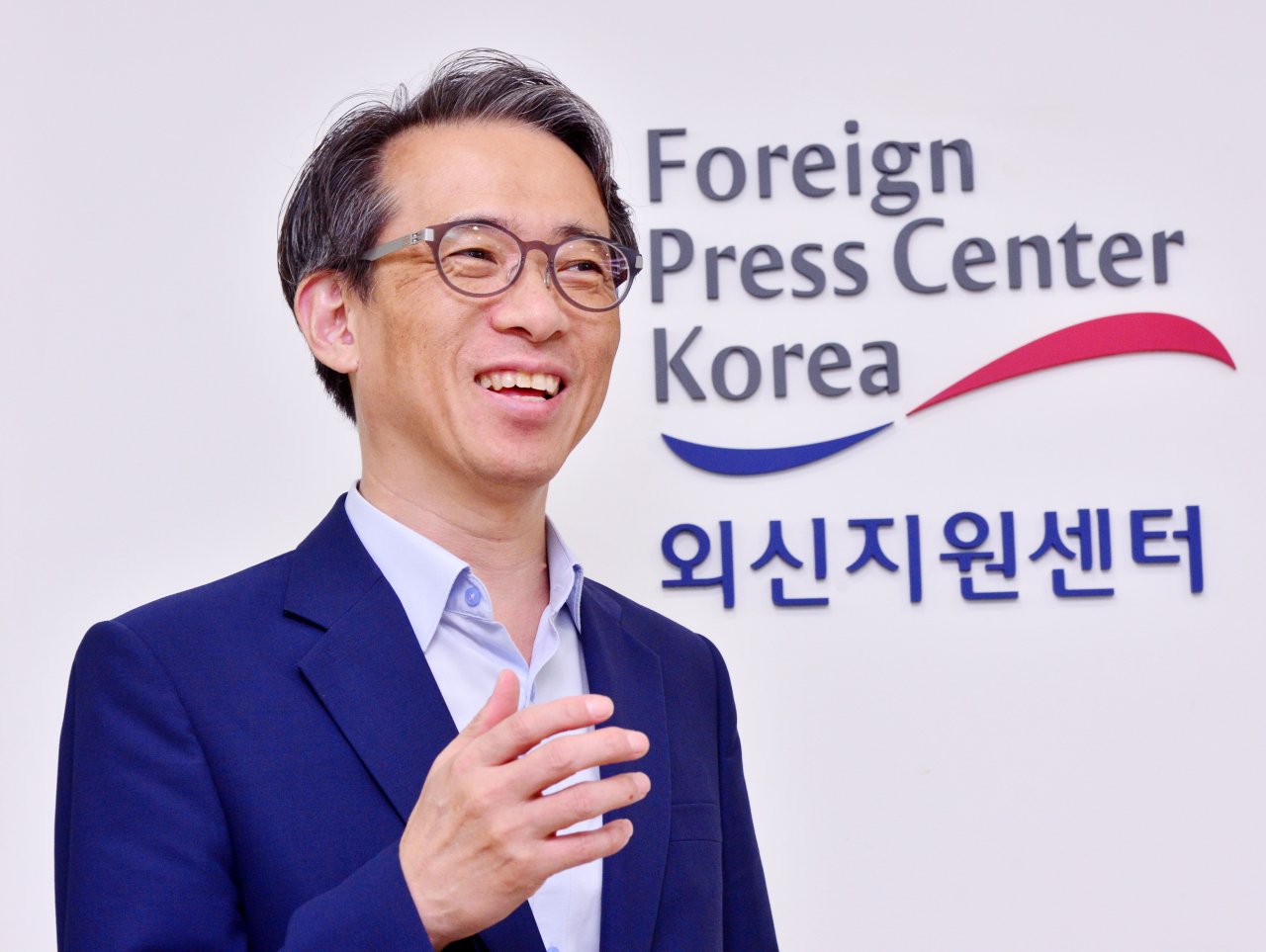Seoul and Tokyo should contain dispute within political sphere
Cultural exchanges must continue despite differences, KOCIS leader says
By Choi He-sukPublished : Aug. 25, 2019 - 17:26
South Korea and Japan must make separate efforts to address history and must maintain a relationship of cooperation to resolve the current diplomatic issues, says Korean Culture and Information Service Director Kim Tae-hoon.
“Just like domestic politics, international politics need compromise. Fundamentally, trust (between Korea and Japan) must be rebuilt based on (mutually acceptable) historical views,” Kim said, describing the current situation as a case where trust has been damaged by historical issues.
“Just like domestic politics, international politics need compromise. Fundamentally, trust (between Korea and Japan) must be rebuilt based on (mutually acceptable) historical views,” Kim said, describing the current situation as a case where trust has been damaged by historical issues.

Saying he believes there are “many opportunities” to mend ties between the two countries, Kim went on to say that he hoped the two sides would reach an agreement within the next year.
Stressing that President Moon Jae-in had left open the possibility of dialogue with Japan, Kim pointed to the likely effects of the dispute on events such as next year’s Tokyo Olympics.
“The Tokyo Olympics were planned to enable Japan to play a leading role in Asian, and global, society, but if Korea-Japan relations continue to deteriorate, it will be damaging to the games,” he said, adding that economic issues and US-North Korea dialogue would also act as variables in Seoul-Tokyo relations.
Referring to Moon’s Liberation Day speech on Aug. 15, Kim said Japanese media seemed relieved that Moon had avoided taking a hard-line stance and reiterated the need for dialogue.
“There will be the Korea-China-Japan culture and tourism ministers’ meeting, and (KOCIS) is preparing a Korea-China-Japan arts event. Exchanges among people, and cultural exchanges (with Japan), are continuing.”
The three-day annual culture ministers’ meeting is scheduled to begin in Incheon on Thursday.
Kim also warned against using nationalistic sentiment for political gain, saying such tactics could cause problems that would be far more difficult to resolve.
“(Using nationalism politically) can have visible short-term results, but have big side effects,” Kim said.
Comparing public sentiment to a large ship that cannot change direction quickly, Kim said changing negative public opinion is more difficult than reaching a political agreement between two countries.
“A political leader using public sentiment for political goals could lead to a situation where the public cannot accept it even after (the current Korea-Japan issues) are resolved.”
Citing the decision by Seoul’s Jung-gu Office to take down “boycott Japan” banners, Kim said it had served as a lesson, and highlighted the mature response of the Korean public.
Soon after the consumer-led boycott on Japanese goods began, the Jung-gu Office hung hundreds of banners supporting the campaign, but quickly removed them after drawing heavy fire from the public.
When asked about KOCIS, Kim said the organization was reaching out to international society through diverse channels.
“Ordinary people aren’t usually interested in Korea’s history and conflicts, so we work (by introducing) those who are well versed in historical issues to publications in other countries,” Kim said, adding that his organization also produces videos to spread information, and works with Korean culture centers in other countries.
“I think we need to win the international community’s support by spreading accurate information through the culture centers, and the vernacular media.”
He added that KOCIS is carrying out related projects in Japan, including seminars and forums featuring Japanese academics who disagree with the Japanese government’s claims about history.
Within Korea, KOCIS works with foreign correspondents, he said, providing information and helping journalists gain access to sources.
Kim also rebutted the Japanese media’s claims that Seoul is obsessing over the past while Tokyo is taking a future-oriented approach.
“The future is important, but (the two countries) must share an accurate view on history, and after that the governments must work on the solution (to the current situation),” Kim said, adding that the Abe government is turning away from history.
According to Kim, Japanese political leaders’ stance on historical issues is at the root of the difference in the way Japan and Germany have approached past wrongdoings.
“(The Abe government) wants to erase history, recreate Japan’s past glories, and … revise the constitution, so they do not want to let the public know about the atrocities during the war,” Kim said.
He added that Koreans who collaborated with Japan during its occupation of the Korean Peninsula had gone unpunished after liberation in 1945, and that this also contributed to the problem.
“The US military government placed Japanese collaborators in leadership positions, and history was erased. I feel that history is that is easily forgotten and manipulated,” Kim said.
“There are efforts to erase history in Korea also, but those things need to be turned back, and our descendants must be educated about history.”
By Choi He-suk (cheesuk@heraldcorp.com)







![[KH Explains] Hyundai's full hybrid edge to pay off amid slow transition to pure EVs](http://res.heraldm.com/phpwas/restmb_idxmake.php?idx=644&simg=/content/image/2024/04/18/20240418050645_0.jpg&u=20240419100350)







![[From the Scene] Monks, Buddhists hail return of remains of Buddhas](http://res.heraldm.com/phpwas/restmb_idxmake.php?idx=652&simg=/content/image/2024/04/19/20240419050617_0.jpg&u=20240419175937)

![[KH Explains] Hyundai's full hybrid edge to pay off amid slow transition to pure EVs](http://res.heraldm.com/phpwas/restmb_idxmake.php?idx=652&simg=/content/image/2024/04/18/20240418050645_0.jpg&u=20240419100350)

![[Today’s K-pop] Illit drops debut single remix](http://res.heraldm.com/phpwas/restmb_idxmake.php?idx=642&simg=/content/image/2024/04/19/20240419050612_0.jpg&u=)